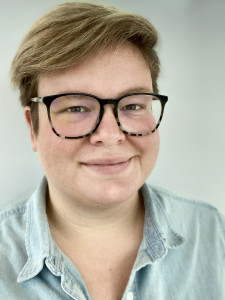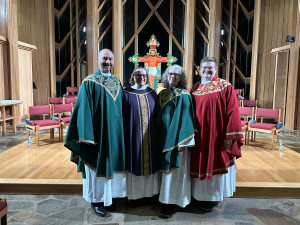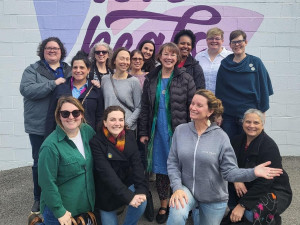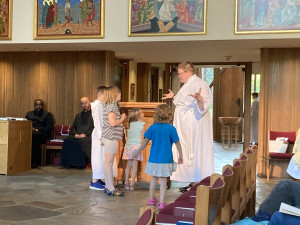"These years at Sewanee have been some of the best of my life. Some of the hardest and most difficult, but also the most beautiful and enriching."

Long before Shelley Martin, T’24, arrived in Sewanee as a seminarian, she carried the Mountain with her—literally. While living in Augusta, Georgia, she says, “I was walking through my church one day, and I saw a brochure for Sewanee sitting on an entry table. I grabbed it and kept it in my laptop case the entire time I was finishing my undergraduate degree.” Martin knew that she wanted to pursue her formation in the Southeast, relatively near her family in North Carolina and her sending parish in Augusta. After conducting online research and speaking with seminarians and School of Theology alumni, she decided Sewanee was the right fit.
Martin says she felt similarly resolute in her call to the priesthood, though her route to earning a B.A. in integrated studies—which blends the disciplines of anthropology and communications—from Augusta University was “circuitous.” Soon after graduating from high school in 2004, she enrolled at Appalachian State University, but a family emergency altered her course. She married in 2006, and soon after found herself navigating the hurdles of the late-2000s economic recession and the novel challenges of being a military spouse. In 2013, her daughter was born. After years of balancing parenthood and coursework, she earned her bachelor’s degree in 2020.
As part of her B.A. program, Martin was required to serve an internship, and she chose to work with her campus’ Episcopal ministry, eventually becoming the missioner. It was in this role that she found her path to the priesthood. “We had a lot of food insecurity on campus, and a big part of my ministry focused on meeting the immediate needs of my students,” she says. As she engaged in outreach, she discovered she excelled at helping people through times of uncertainty and crisis. “I learned that if students were hungry, I could show up with sandwiches from Jimmy John’s. I could park myself in the student union and say, ‘I’m here.’”

During her first year at Sewanee, Martin intentionally shifted away from exploring campus ministry. “I realized quickly after I got here that I needed to step back and make space for the Holy Spirit to do its work.” In allowing room for new spiritual experiences, she says she has collected a wealth of memories. She recalls a recent afternoon she spent with classmates the Rev. Alane Osborne, T’24; the Rev. Kris Paul, T’24; and the Rev. Eric Bash, T’24, practicing for their pastoral liturgics class. “We were sitting in Alane’s kitchen. Kris’s parish had gifted her some oxblood-red vestments—gorgeous things they were going to throw out—and she also had a vintage Eucharistic set from the same parish,” she says. “Eric was humming through one of the eucharistic prayers as we were busying ourselves with preparing our practice elements.” Martin says she and her classmates were “each moved to tears, realizing that a moment like this—when we sensed our deep connection to Christ and each other—is what all the work has been for.”
Martin says she was also transformed by her 11-week Clinical Pastoral Education (CPE) experience, during which she provided pastoral care at UNC Health, an integrated healthcare system in Chapel Hill, North Carolina. Over the course of the internship, Martin performed her first baptism, which was in the context of “an emergency situation,” she says. “It was a really beautiful moment, one that I will always carry with me.”

Committee for women in ministry, Martin assisted
in organizing a 2023 trip to Thistle Farms in Nashville to meet the Rev. Becca Stevens, C'85, T'90, H'13.
Though CPE included a number of emotional challenges, Martin says there was also joy. One of her assignments was making rounds in the hospital’s medical progressive care unit, which provides intermediate care between the medical intensive care unit and the general wards. “A lot of patients were there for transplants, or they were trying to get on the transplant registry,” she says. One afternoon, she checked in on one of these patients—a woman whose daughter was visiting her. “The woman had just received news that she was approved for her transplant and would be getting it the next day,” Martin says. “Both the mom and the daughter were so excited. Lightness and light were billowing from them.”
Moving on from CPE was its own type of obstacle, Martin says. “It’s an incredible experience that people let you drop in on their lives in a moment of need, or during moments of joy or profound sorrow—the bellowing, guttural sorrow that people face in the hospital.” Throughout the 11 weeks, Martin collected rocks to symbolize patients she served who had died. Eventually, she incorporated the rocks, and other meaningful items from her internship, into a mandala. Before leaving Chapel Hill, she presented each rock to a different UNC colleague. “I said, ‘Keep the rock and create a ritual. Carry it in your pocket. Remember you’re doing really good and important work.’” Martin says she kept only one rock—the one representing the young girl whom she baptized. “It was a different color than all the rest. With God, you find ways of making every situation make sense.”

the seminary during her sermon at Community
Eucharist in Chapel of the Apostles
In the first semester of her junior year at Sewanee, Martin was hit with a life change—her former husband let her know that he wanted to divorce. “It was a shock,” she says, “but it was absolutely the right thing. This is what I’ve told people before and since: ‘God calls us into relationships, and I think God can call us out of relationships.’” She adds that she’s grateful for the timing of the transition. “I don’t know if I could have survived my divorce and the first years of single parenthood without being here [at Sewanee] in this space, with these people.” She credits her classmates for their support and says that the routines inherent in seminary life have been helpful.
In gratitude for her time on the Mountain, Martin set up a monthly gift to the School of Theology last year. The amount of her recurring donation—$13.31—is a nod to Psalm 133:1, the source of the University motto. “These years at Sewanee have been some of the best of my life,” she says. “Some of the hardest and most difficult, but also the most beautiful and enriching.”
Gifts from current Sewanee students have special meaning, says School of Theology Director of Annual Giving the Rev. Casey Perkins, T’22. “Enrolling in graduate school often necessitates making tough financial choices, and this is certainly true for many of our seminarians,” he says. “Given the budgetary sacrifices that often come with pursuing formation, it’s especially inspiring when students choose to give back.”
For her part, Martin says, “There’s no way I could have come to Sewanee without the scholarships that were provided. No imaginable way.” In her view, supporting seminarians means building a more equitable church. “You’re limiting Christ’s voice if you can’t provide a seminary education to students on the margins—whatever that margin may be.” She adds that, throughout the Episcopal Church’s history, “We’ve heard a lot from people who can afford this theological journey. It’s our responsibility—those of us who have benefitted from our education here—to make sure others’ voices can be heard.”

